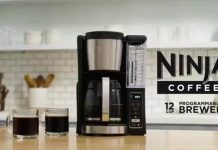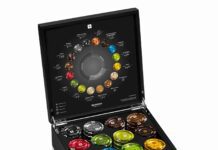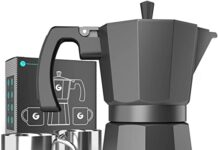Wondering about the best way to kickstart your Bialetti coffee maker? Let us settle the age-old debate of whether to start it with hot or cold water. Many coffee enthusiasts have pondered over this question, but worry not, for we are here to provide clarity. By the end of this article, you’ll have a clear understanding of which water temperature is ideal for your Bialetti, ensuring that you can savor every flavorful cup with confidence.
This image is property of www.cuppers.ca.
Health Considerations
Effect of hot water on coffee
When it comes to using hot water in the Bialetti coffee maker, there are a few health considerations to keep in mind. One of the primary concerns is the potential for the hot water to extract more of the coffee’s oils and compounds, some of which may have negative health effects in large quantities. However, it’s worth noting that the amounts of these substances in a cup of coffee are generally considered to be within safe limits for most people. Additionally, hot water may also have a slight impact on the acidity of the coffee, which could affect individuals with sensitive stomachs or acid reflux.
Effect of cold water on coffee
Using cold water in the Bialetti coffee maker may have different health considerations than using hot water. While cold water can still extract the flavors and compounds from the coffee, it may not do so as effectively as hot water. As a result, the coffee may have a milder flavor and potentially lower levels of certain compounds. For those who are looking to minimize their intake of coffee oils and other substances, using cold water may be a viable option. However, it’s essential to ensure that the cold water is safe for consumption, as using contaminated water can have adverse health effects.
Brewing Efficiency
Hot water extraction
When it comes to brewing efficiency, hot water extraction tends to be more effective than cold water extraction. Hot water can more efficiently dissolve the coffee grounds, allowing for greater extraction of flavors and compounds. This leads to a more robust and full-bodied cup of coffee. The heat from the water also helps to speed up the extraction process, reducing the brewing time required. For those who value efficiency and a bolder flavor profile, hot water extraction is likely the preferred method.
Cold water extraction
On the other hand, cold water extraction may be preferred by those who prioritize a smoother and milder flavor profile. Cold water seeps into the coffee grounds slowly, resulting in a longer extraction process. This slower extraction can lead to a coffee that is less acidic and potentially less bitter. However, it’s worth noting that cold water extraction typically requires a more extended brewing time compared to hot water extraction. So, while it may produce a different flavor profile, it may not be as efficient in terms of time.
Flavor Profile
Hot water extraction flavors
Hot water extraction tends to produce a more robust and intense flavor profile. The heat from the water helps to extract the oils and compounds from the coffee grounds, resulting in a bolder and more flavorful cup of coffee. The flavors extracted through hot water can range from rich and chocolatey to fruity and acidic, depending on the type of coffee beans used. For those who enjoy a strong and vibrant coffee experience, hot water extraction is likely to deliver the desired flavor profile.
Cold water extraction flavors
Cold water extraction, on the other hand, produces a smoother and milder flavor profile. Since the water seeps into the coffee grounds slowly, it extracts fewer of the oils and compounds that contribute to acidity and bitterness. This can result in a coffee that is smoother, less acidic, and potentially sweeter. The flavors extracted through cold water tend to be more subtle and delicate, allowing for a different drinking experience. Cold water extraction may be favored by those who enjoy a milder and more nuanced cup of coffee.
Bialetti Design and Instructions
Manufacturer recommendations
When it comes to using the Bialetti coffee maker, it’s essential to follow the manufacturer’s recommendations for both hot and cold water extraction. Bialetti recommends using hot water and heat sources such as stovetop or induction to achieve the optimal brewing conditions. This aligns with the traditional Italian method of using hot water for brewing coffee in the Bialetti Moka pot. However, the Bialetti coffee maker can also be used with cold water for a different brewing experience. In this case, it’s crucial to ensure that the coffee maker is designed for cold water extraction and follow the specific instructions provided by the manufacturer.
Design of the Bialetti coffee maker
The design of the Bialetti coffee maker plays a crucial role in its brewing capabilities. The classic Moka pot consists of three main parts: the lower chamber for water, the middle chamber for coffee grounds, and the upper chamber for the brewed coffee. This design allows for the water to be heated and forced up through the coffee grounds, resulting in the extraction of flavors and compounds. The Bialetti coffee maker is known for its durability and ability to maintain consistent heat during the brewing process, ensuring a reliable extraction regardless of the chosen water temperature.
This image is property of miro.medium.com.
Brewing Time
Hot water extraction time
When using hot water in the Bialetti coffee maker, the brewing time tends to be relatively short. The heat from the water helps to expedite the extraction process, allowing for the desired flavors and compounds to be released from the coffee grounds efficiently. Depending on the size of the coffee maker and personal preferences, the brewing time can range from a few minutes to around 10 minutes. It’s essential to monitor the brewing process closely to prevent over-extraction and bitterness from developing.
Cold water extraction time
In contrast, cold water extraction takes significantly more time than hot water extraction. The slower seepage of the cold water into the coffee grounds requires a more extended brewing time to extract the desired flavors. Depending on the desired strength and flavor profile, the brewing time for cold water extraction can range from several hours to overnight. This extended brewing time allows for a more gentle extraction process, resulting in a coffee that is smoother and potentially less bitter. It’s important to factor in the additional time required when opting for cold water extraction.
Preventing Overheating
Potential overheating issues with hot water
When using hot water in the Bialetti coffee maker, there is a potential risk of overheating. Overheating the coffee can result in the extraction of undesirable flavors, such as burnt or bitter notes. Additionally, excessive heat can cause the coffee to become over-extracted, leading to a harsh and unpleasant taste. To prevent overheating, it’s crucial to closely monitor the brewing process and ensure that the heat source is set at an appropriate level. controlling the heat can also help prevent the handle of the coffee maker from becoming too hot to handle.
Preventing overheating with cold water
Unlike hot water extraction, cold water extraction does not carry the same risk of overheating. The longer brewing time and slower extraction process allow for a more controlled and gentle release of flavors from the coffee grounds. However, it’s still essential to pay attention to the brewing time and ensure that the coffee maker is not left unattended for an extended period. Proper maintenance, such as regular cleaning and descaling, is also crucial in preventing any potential issues that could affect the brewing process.
This image is property of i.ytimg.com.
Energy Efficiency
Amount of energy used for hot water extraction
Using hot water in the Bialetti coffee maker typically requires the use of a heat source, such as a stovetop or induction burner. The amount of energy consumed during the brewing process will depend on the heat source used and the duration of the brewing time. Generally, the energy consumption for hot water extraction is relatively low compared to other brewing methods, as the Bialetti coffee maker is designed to operate efficiently. However, it’s worth considering the energy usage and environmental impact when opting for hot water extraction.
Amount of energy used for cold water extraction
Cold water extraction in the Bialetti coffee maker generally consumes less energy compared to hot water extraction. This is because cold water extraction does not require a heat source throughout the brewing process. Instead, the coffee grounds steep in the cold water for an extended period, allowing for the flavors to be slowly extracted over time. While the energy consumption may be lower, it’s still essential to consider any potential environmental impacts associated with using and disposing of cold water.
Personal Preferences
Preference for hot or cold flavors
Personal preferences play a significant role in determining whether hot or cold water extraction is preferred. Some individuals may enjoy the bold, robust flavors that hot water extraction provides. The heat from the water can enhance the intensity and depth of the coffee’s flavors, making it suitable for those who appreciate a strong and vibrant cup of coffee. On the other hand, some individuals may prefer the smoother and milder flavors that cold water extraction offers. The cooler brewing process reduces the presence of acidity and bitterness, creating a more delicate and nuanced coffee experience.
Preference for brewing time
The preferred brewing time is another personal preference that can influence the choice between hot and cold water extraction. Hot water extraction, with its relatively short brewing time, may be favored by those who appreciate a quick and efficient brewing process. This can be especially beneficial for individuals with a busy lifestyle who value convenience. In contrast, cold water extraction requires a longer brewing time, making it ideal for individuals who enjoy a slow and deliberate brewing process. This method allows for a more gradual extraction of flavors, resulting in a different drinking experience.
This image is property of d2og65f1kwx1z6.cloudfront.net.
Coffee Quality
Impact of water temperature on coffee quality
The water temperature used during the brewing process can have a significant impact on the overall coffee quality. Hot water extraction tends to result in a coffee that is more robust, full-bodied, and flavorful. The heat helps to extract the oils and compounds from the coffee grounds, enhancing the intensity of the flavors. Conversely, cold water extraction produces a coffee that is smoother and potentially less acidic. The cooler temperatures result in a more delicate extraction process, allowing for a milder and nuanced flavor profile. Both hot and cold water extraction methods can produce high-quality coffee; it ultimately depends on personal preferences.
Factors beyond water temperature that affect coffee quality
While water temperature is an essential factor in coffee quality, it is not the sole determinant. Other factors, such as the quality of the coffee beans, grind size, coffee-to-water ratio, and freshness of the coffee, also play a crucial role. Using freshly roasted and properly ground coffee beans can significantly enhance the overall flavor and aroma of the coffee, regardless of the water temperature used. Additionally, factors such as proper storage, cleanliness of the coffee maker, and adherence to brewing techniques can further contribute to the overall quality of the coffee.
Conclusion
When it comes to the question of whether to start Bialetti brewing with hot or cold water, there are several factors to consider. The choice between hot and cold water extraction depends on personal preferences, desired flavor profile, brewing time, and health considerations. Hot water extraction tends to offer a bolder and more intense flavor profile, with a relatively shorter brewing time. On the other hand, cold water extraction results in a smoother and potentially milder flavor profile, but with a more extended brewing time. It’s important to follow the manufacturer’s recommendations and consider the impact of water temperature on coffee quality. Ultimately, the choice between hot and cold water extraction is a matter of personal taste and experimentation.
This image is property of images.saymedia-content.com.








































